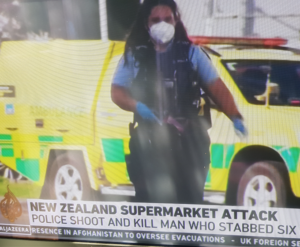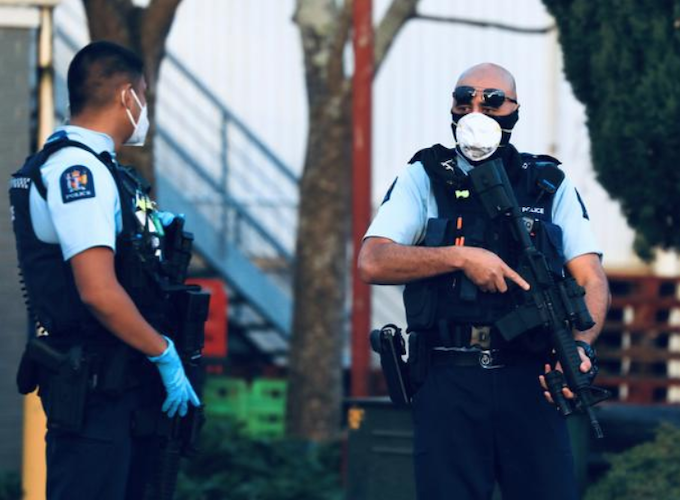By Sarah Robson, RNZ News Reporter
Name suppression for the man responsible for yesterday’s New Zealand terror attack at a west Auckland supermarket has been revoked, but his name cannot be published yet.
The High Court has given his family who live overseas at least 24 hours to seek further suppression orders.
The Sri Lankan national was shot dead by police after stabbing six people inside Countdown in LynnMall.
Suppression orders prevented details about his identity and background from being made public.
The government filed an urgent application last night to have the court orders lifted, so details about the man’s identity and background could be made public.
In a judgment last night, Justice Wylie said there was no longer any proper basis for the suppression orders.
But he said the man’s family live overseas and lawyers needed time to contact them to take instructions.
He said he could consider extending the 24-hour period if needed.
Isis propaganda
However, it can be revealed the man was sentenced in July to one year of supervision after he was found guilty by a jury in the High Court at Auckland of two charges of possessing Isis propaganda that promoted terrorism.
He was found guilty of another charge of failing to comply with a search, but he was acquitted of a third charge of possession of objectionable material and a charge of possessing a knife in a public place.

The state had sought to charge him under the Terrorism Suppression Act, but failed after a High Court judge ruled that planning a terror attack was not an offence under the law.
Because he had already spent three years in custody awaiting trial, he did not receive a further prison term for his offending.
Despite that, Prime Minister Jacinda Ardern said he had been under surveillance since 2016, because of his support for a violent ideology inspired by Islamic State.
The man was being so closely monitored by a surveillance and tactical team that police shot him within 60 seconds of the attack starting.
On the radar of authorities
He arrived in New Zealand in October 2011.
He first came to the attention of authorities in 2016, when police formally warned him about posting anti-Western, pro-Isis, extremist content on the internet.
The man had also at some point told a worshipper at an Auckland mosque that he wanted to go to Syria to fight for Isis.
In a July 2020 judgment, Justice Downs said in May 2017, he had booked a one-way flight to Singapore but was arrested at Auckland Airport.
When police searched his apartment, they found a large hunting knife under the mattress on the floor and secure digital cards containing fundamentalist material, including propaganda videos and photos of the man posing with a firearm.
He was remanded in custody and in June 2018, he pleaded guilty to distributing restricted publications. In August 2018, he was sentenced to supervision, Justice Downs’ 2020 judgment said.
But the day after his sentencing, he went and bought the same model of hunting knife that police had earlier found under his mattress.
Arrested again
He was arrested again and another search found a large he had a large amount of violent Isis material, including one video about how to kill “non-Muslims”.
This time, the state sought to charge the man under the Terrorism Suppression Act, for planning a terrorist act.
But Justice Downs said that in itself was not an offence under the law.
In his decision, Justice Downs said: “Terrorism is a great evil. ‘Lone wolf’ terrorist attacks with knives and other makeshift weapons, such as cars or trucks, are far from unheard of.
“Recent events in Christchurch demonstrate New Zealand should not be complacent. Some among us are prepared to use lethal violence for ideological, political or religious causes.
“The absence of an offence of planning or preparing a terrorist act … could be an Achilles heel.”
Justice Downs said it was not for the courts to create such an offence.
“The issue is for Parliament,” he said.
A copy of Justice Downs’ judgment was provided to the Attorney-General, the Solicitor-General and the Law Commission.
High Court trial
The man finally stood trial in the High Court at Auckland in May this year, on lesser charges.
A jury found him guilty of two charges of possessing Isis propaganda that promoted terrorism and one charge of failing to comply with a search.
He was acquitted of a third charge of possessing objectionable material and a charge of possessing a knife in a public place.
The man was sentenced in July.
In her sentencing notes, Justice Fitzgerald said the two publications on which he was found guilty were “nasheeds” – religious hymns.
Both were classified by the Censor as objectionable and contained Isis imagery and lyrics.
Justice Fitzgerald did not accept the explanation that he was listening to them to improve his Arabic language skills.
“Rather, I accept that the broader context to your possession of these nasheeds, which included a range of other materials relating to Isis or Isil, suggests that you have an operative interest in Isis.
“In other words, I do not accept that you might have simply stumbled across these and other Isis-related materials in your research of Islam or the historic Islamic State,” she said.
Report raised further flags
A pre-sentencing report raised further flags.
“The report writer suggests that you support the goals and methods of Isis,” Justice Fitzgerald said.
“The report writer concludes that the risk of you reoffending in a similar way to the present charges is high.
“It suggests that you have the means and motivation to commit violent acts in the community and, despite not having violently offended to date, as posing a very high risk of harm to others.”
Given he had already spent three years in custody awaiting trial, the man was sentenced to one-year supervision.
There were restrictions on his use of electronic devices, the internet and social media.
“The Police and Community Corrections clearly have concerns that you pose a not insignificant risk to the broader community,” Justice Fitzgerald said in her sentencing notes.
“I do not know whether those concerns are right and I sincerely hope that they are not, though having regard to all of the materials available to the court, I can say that they are not wholly fanciful.”
This article is republished under a community partnership agreement with RNZ.
Article by AsiaPacificReport.nz






